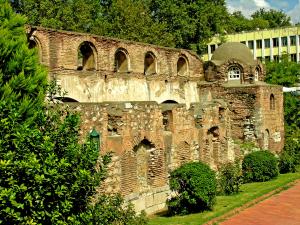
The Seventh Ecumenical Council, Nicea II, convened in 787, and officially declared the use and veneration of images to be acceptable to the Christian faith. The fathers of the council followed the lead of St. John of Damascus and others who had defended the use of images against those iconoclasts who not only rejected their veneration, but said they should not be made. Iconoclasts had destroyed many ancient images so as to enforce their ideology unto the church. The council established the official dogmatic response to the iconoclasts, declaring them not only to be mistaken, but heretics. Nicea II contributed much to the history of Christian theology, helping to promote a greater understanding of the consequences of the incarnation, for as God became man, so the invisible creator became personally visible in the form of Jesus Christ. In doing so. God affirmed the use of images by making an image himself, for by becoming visible, he has an image, and that image can then be duplicated and used in order to help us reach out to and seek after him.
While, dogmatically, the fathers of the Seventh Ecumenical Council gave the church the answer which it needed, iconoclasts continued to hold positions of power. A new iconoclastic period soon emerged and many of the fathers from Nicea II became confessors and martyrs of the faith. This shows us that the council, while authoritative, was not immediately successful, for it did not put a stop to iconoclasm but only reinforced the battle lines between those who supported and used icons and those who did not. Indeed, in Byzantium, it soon seemed that the council was repudiated and not to be believed. This is common with many ecumenical councils: they foster resistance, and that resistance often seems to hold on and be stronger than the supporters of the councils themselves; if we are to look at the immediate aftermath of a council, it would be easy for their critics to say such councils were failures and did not hold dogmatic authority. The first Council, at Nicea, led to a major Arian resistance which took centuries to overcome. Chaos came after Nicea as theological battle lines divided Christians from each other. And yet, dogmatically, its teachings were necessary, just as much as other councils, which often spoke to and dealt with problems of their time, problems which did not immediately go away just because the councils provided theological answers to them.
History shows us we must look at more than the way councils answered dogmatic questions; we must also look at how those answers slowly made their way to the faithful and became truly lived out and believed. When we see that, we should not be surprised if and when an ecumenical council is called, it might not be immediately heeded, and it will take time to work out the spirit of the council to determine how those answers work and why they were needed. To reject a council because of the “chaos” and dissention afterward will only lead us to dismiss all councils, because all councils are surrounded by such chaos and resisters.
Councils, then, have “thorns” which they have to deal with. Dissent causes people to reflect deeper on the message of a council, to make sure the spirit of the council is heeded instead of ignored, to keep the fathers of the council humble, just as St. Paul himself experienced a thorn at his side which kept him humble:
And to keep me from being too elated by the abundance of revelations, a thorn was given me in the flesh, a messenger of Satan, to harass me, to keep me from being too elated. Three times I besought the Lord about this, that it should leave me; but he said to me, “My grace is sufficient for you, for my power is made perfect in weakness.” I will all the more gladly boast of my weaknesses, that the power of Christ may rest upon me (2 Cor. 12:7-9 RSV).
While the fathers of the seventh ecumenical council were elated with the temporary support icons received within Byzantium, they soon learned that they could not and should not be triumphalist about it. They could, of course, glorify God in icons and give glory to God for his triumph, but they had to deal with the ramifications of the iconoclastic controversy and deal with those who would reject their council and once again seek to destroy images. They could boast in Christ, in the accomplishments of Christ, and point to the incarnation as the guarantee that what they declared was true: but, to expect that meant that getting everyone to accept the council would be easy would be delusional.
Dealing with contention is not easy. Christ tells us, while speaking about truth, and promoting justice, we must keep mercy in mind, and so deal with our enemies with mercy:
And as you wish that men would do to you, do so to them. “If you love those who love you, what credit is that to you? For even sinners love those who love them. And if you do good to those who do good to you, what credit is that to you? For even sinners do the same. And if you lend to those from whom you hope to receive, what credit is that to you? Even sinners lend to sinners, to receive as much again. But love your enemies, and do good, and lend, expecting nothing in return; and your reward will be great, and you will be sons of the Most High; for he is kind to the ungrateful and the selfish. Be merciful, even as your Father is merciful (Lk. 6:31-36 RSV).
Love for others, including our enemies, must always be done with justice; when we see people doing wrong, we want them to change their ways and do penance for the harm they have done. We must not overburden them with penance and make them despair so that they do not change their ways, but we must not think being merciful means we cannot speak out against them, fight against the evil they promote, and not expect them to make reparations for the harm they have done. Instead, it means we must not act out of a desire for vengeance; we must seek justice, with a desire for their reform and salvation, while of course, we must always be concerned with those they have harmed and show mercy to them as well, a mercy which includes trying to fix the wrongs they have suffered.
Forgiveness and mercy are not cheap; they come with a price, the price of reform, and to be merciful to those who have done wrong is to seek their reform, not to ignore the harm they have done. The fathers of the seventh ecumenical council sought the conversion of iconoclasts. They desired such iconoclasts would turn away from their error and join in with them in the restoration and veneration of image. Likewise, when the second iconoclastic period was over, the church once again sought those who struggled against images and find a way to have them join with the rest of the faithful, to recognize the way icons connect us with God and the saints already joined with God. So we, too, should seek to make converts from our enemies, showing them love, a love which can sometimes be tough as it expects much from such converts, and yet, however tough it is, the love contained within makes it just and not cruel.
Stay in touch! Like A Little Bit of Nothing on Facebook.
If you liked what you read, please consider sharing it with your friends and family!













